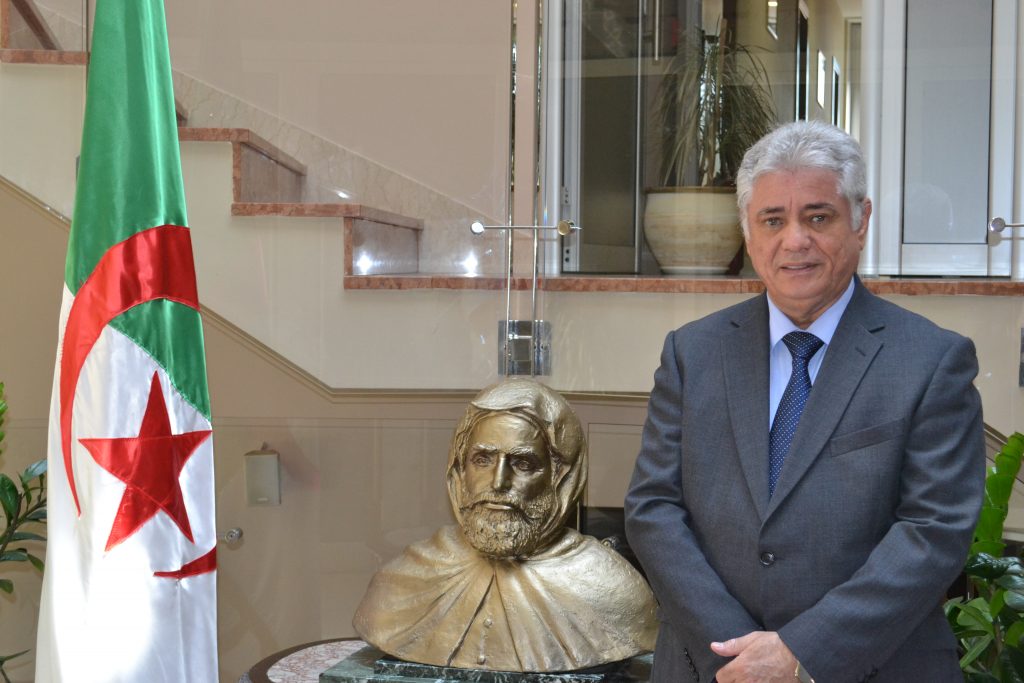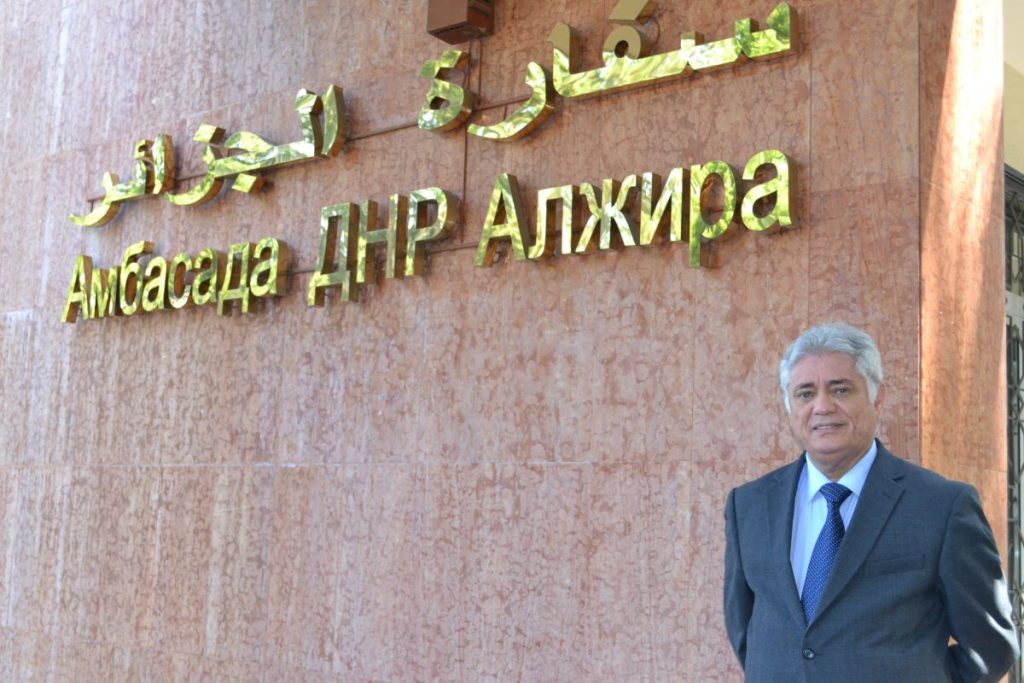Political ties between Serbia and the African countries are strong and Serbia enjoys high esteem among African peoples
The values of tolerance, peace, reconciliation and solidarity emerge always in times of crises whether caused by wars, natural or health disasters as it is the case of Coronavirus spread across the world, which proved that the mankind has no future without a sense of interdependence, cooperation and tolerance, said Algerian Ambassador to Belgrade, H.E. Abdelhamid Chebchoub.

On July 5th Algeria celebrated the 58th anniversary of independence. What is the symbolic moment of this anniversary?
The 5th of July marks the day when Algeria recovered its National Independence in 1962 after a national liberation war that had begun on November 1st, 1954, putting an end to the French colonial rule that had been imposed to the Algerian people for 132 years.
It is worth recalling that French colonial troops invaded Algeria on 5 July 1830 subjugating the Algerian people under an unjust, oppressive and inhuman colonial system.
This day is celebrated in Algeria as the date on which the country regained its independence, but also as a Youth Day, as acknowledgement for the major role played by the Algerian youth in the national liberation war.
This year’s anniversary was under the sign of the return to Algeria of the remains of 24 resistance fighters killed during battles against French occupation in the 19th century. Their heads were decapitated and sent to Paris as trophies before they were kept and even displayed in the “Musée de l’Homme” in Paris.
These martyrs have been deprived for more than 170 years of their natural and human rights to be buried. So, a national ceremony was organized to pay tribute to them and lay their remains to rest in dignity.
It was effectively a highly emotional moment when the Algerian people recalled its glorious past and epic resistance.
How would you describe the political situation in Algeria today, in terms of stability, security and cooperation?
The events that occurred in Algeria last year marked the beginning of a new era in the process of strengthening democratic institutions to adapt them to the imperatives of profound changes that occurred in the Algerian society.
Algerian people expressed their aspirations peacefully, in a way that has aroused the admiration of the world and authorities have decided to respond to these legitimate aspirations.
In that spirit, as soon as the President of the Republic was elected, last December, a deep reform program including the revision of the Constitution was launched to enshrine individual and collective freedoms, establish greater transparency in the functioning of State institutions and meet the imperatives of economic, cultural and social development.
“According to experts in economic forecasting and analysis, the prospects of African development are very promising”

How is important today, especially in the time of the pandemic caused by Covid-19, to promote values such as peace, tolerance and national reconciliation? How is Algeria dealing with the pandemic?
Algeria’s commitment to promote peace, tolerance, national reconciliation and solidarity comes from its geographical location at the crossroad of several regions and civilizations, its history and its own experience in putting an end to a long-lasting period of terrorism by restoring peace and implementing reconciliation.
Indeed, the values of tolerance, peace, and reconciliation emerge always in times of crises whether caused by wars, natural or health disasters as it is the case of Coronavirus spread across the world, which proved that the mankind has no future without a sense of interdependence, cooperation and tolerance.
In that spirit of solidarity, Algeria contributes to the African Fund set up by the African Union to fight against the pandemic on the continent.
Alongside other countries, Algeria is committed to provide a united and comprehensive response to the pandemic. Internationally, Algeria participates in several fora gathered together with the aim to fight against COVID 19, bilaterally, it has an extensive cooperation in that area with several countries, especially with China.
The friendship between the then Yugoslavia and Algeria was forged more than 60 years ago. How would you rate relations between Serbia and Algeria?
Before answering, let me take this opportunity to pay tribute to the memory of President Tito for his strong support to the Algerian national liberation struggle, as well as to Stevan Labudović, the cameraman of Filmske Novosti, whose images revealed to the world, the reality of the war in Algeria.
Political relations between our two countries are excellent. Although the exchange of visits has been put on hold temporarily due to the current situation, regular contacts have been maintained. The Ministers of Foreign Affairs of our two countries had a phone conversation recently to discuss issues of common interest.
On the issue of Kosovo, Algeria’s position of non-recognition of the unilateral declaration of independence of Kosovo remains unchanged in accordance with the international law.
“We plan to organize a joint Algerian – Serbian business forum to facilitate contacts between companies and identify investment opportunities”
In your opinion, what could be the areas of cooperation to be further explored by economic operators of the two countries?
Areas such as agriculture, ICT, and tourism offer business opportunities that should be explored further by economic operators of both countries. Speaking about tourism as an example, Algeria remains an unknown destination despite the natural diversity and outstanding monuments it offers.
From January to October 2019, exchanges amounted to 194,227 million US dollars, showing that bilateral trade between our countries is far below existing real potentials.
Within the framework of the next 21st session of the Algerian-Serbian Joint Committee to be held as soon as conditions are met, pending bilateral agreements in various areas are planned to be signed thus giving impetus to the cooperation. With our partners from Serbia, we plan to organize as well, a joint Algerian – Serbian business forum to facilitate contacts between companies, identify investment opportunities on both sides and outline the legal framework for business cooperation.
Some sources of tension persist in your region, in Western Sahara, in Libya, in Sahel. How Algeria contributes to the search for solutions to these crises?
The Algerian position on the issue of Western Sahara is very clear. This territory has been listed on the UN list of Non-Self-Governing Territories since 1963 and as such it is subject to decolonization. Hence, the settlement of this conflict falls within the scope of the UN doctrine on decolonization.
The UN and the African Union have always considered that the solution should be sought in line with the principles and objectives of the United Nations Charter and implemented through a referendum on self-determination. In order to achieve it, the UN established in 1991 the Mission for the Referendum in Western Sahara (MINURSO).
Algeria fully supports the UN efforts to find a just and durable solution by organizing a referendum on self-determination of the last colony in Africa, as foreseen by the Security Council and African Union resolutions.
Concerning the situation in Libya, Algeria is making efforts to actively contribute to the solution to the crisis. The Algerian position is based on its believes that the solution should be sought through the opening of an intra-Libyan inclusive dialogue, rejection of any foreign intervention and the respect for Libya’s sovereignty and territorial integrity.
Despite the current difficulties, we continue investing efforts hoping that the guns in Libya will be silenced and that the brotherly people of Libya will regain peace and stability.
Algeria whose contribution to the signing of a Peace and Reconciliation Agreement in Mali in 2015 was a success praised by the international community, continues to give aid and assistance to the Sahel States in their fight against terrorism and organized crime affecting the region.
“Political ties between Serbia and the African countries are strong and Serbia enjoys high esteem among African peoples”
As a Dean of the Group of African Ambassadors to Serbia, how do you rate relations between Serbia and Africa?
Political ties between Serbia and the African countries are strong and Serbia enjoys high esteem among African peoples.
Together with the Chamber of Commerce of Serbia, the Group of African Ambassadors, which I have the honor to chair, organized last September in Belgrade, a Conference on business opportunities between Africa and Serbia. The Conference that was opened by Mr. Ivica Dacic, Minister of Foreign Affairs of Serbia gathered the Serbian business community and African officials in charge of economic affairs.
According to experts in economic forecasting and analysis, the prospects of African development are very promising. Agenda 2063 adopted by the African Union is the African master plan for transforming Africa into the global powerhouse of the future. The Agenda identifies a number of structural projects in the field of education, science, technology, arts and culture, as well as initiatives to guarantee peace on the continent.
Bearing in mind that the continent constitutes a market of 1.2 billion people and could create a trade flow of 3 trillion dollars and an increase of 33% in trade, the African countries agreed to conclude the Continental Free Trade Agreement (AfCFTA) which entered into force on 30 May 2019.
On behalf of my colleagues, I can assure that the diplomatic missions of the African countries accredited to Serbia will spare no effort in promoting cooperation between Serbia and the African continent.